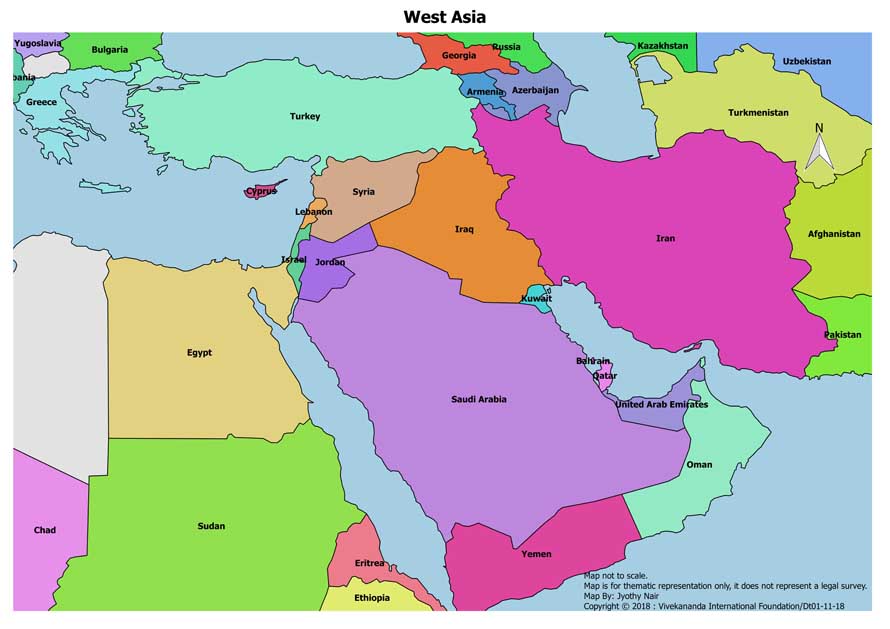Covid -19 has not dented the desire of the hotspots in West Asia to stay hotter despite it being the Holy month of Ramadan. Any how the war weary Saudi Arabia led coalition declared a unilateral ceasefire in Yemen and further extended it which the Houthis did not accept and fighting continued. Meanwhile, Southern Transition Council (which is supported by UAE and has problems with some elements of UN recognised Hadi government) declared autonomy further destabilising the situation in the war ravaged country with exacerbating humanitarian crisis.
The prevailing oil crisis further deepened as for the first time in history the crude traded below zero especially in US commodity markets and Shale producers rushed to save from going bankrupt. In order to stem the low oil prices the Saudi led OPEC could not agree reasonable cuts in production with Russia that led to over production and discounted oil prices and combined with demand contraction in consumer countries due to Covid lockdowns spelt the disaster. President Trump spoke to Russian President Putin and Saudi Crown Prince Salman to renegotiate the deal afresh and it was agreed to cut the production by 10mbpd. But the downward slide continues as the demand is highly inelastic.
The oil producer countries are facing tremendous fiscal and budget deficits due to low crude prices. Although efforts are being made to revive their industries and expenditure no positive outcome could be noticed. It has a direct impact on huge Indian diaspora with major layoffs and contract cancellations. Moreover large number of expat labour is exposed is Covid infection. Indian enterprises may have to shut shop. Most have no option but to return and the host governments are also urging the sending states to accept their citizens back. Government of India is planning the largest ever evacuation exercise especially from the GCC where over 9 million Indians live and work.
Irresponsible Islamophobic statements by some Indians through social media generated huge controversy and retorts even by some Royals from the GCC with good following. Indian government and the missions went on to salvage the situation. Pakistani fake handles tried to take advantage of the controversy by fanning it. Prime Minister Narendra Modi’s telephone discussions with leaders of GCC countries such as Saudi Arabia, the UAE, Qatar, Kuwait, Bahrain and Oman and the leaders of Palestine, Jordan and Egypt. Modi’s conversations emphasised the “strong bilateral relations and the priority attached by India to ‘Think West’ in its foreign policy”. Dr S Jaishankar, External affairs Minister followed it up with his counterparts. The leaders offered assistance in the fight against Covid and also expedited delivery of food and essential items. India also deployed Rapid Response medical teams and equipment to Kuwait, UAE and Bahrain which was highly appreciated. The leaders in West Asia gave sincere assurances to ensure welfare of the Indians.
Libya continued to witness seizes of Tripoli and fighting between General Khalifa Haftar’s forces and the forces and militias supporting the Tripoli based UN recognised government. Seize of Tripoli is now one year old and despite Berlin accord the warring parties continues to receive support, arms and assistance from their regional and international benefactors. Amidst all this, General Haftar on April 27 in a short televised speech declared that he accepted the people’s “Mandate” to scrap the 2015 UN mandated Libyan Political Agreement (LPA) and empower the General Command of the Arab Libyan Armed Forces, which he heads, to take control of the governing institutions in the country. This was his second coup of sorts the first one was in 2014. It indicates that Haftar is no longer committed to international mediation efforts and might resort to an alternate political track and ambitious project. This was decried by Turkish President Erdogan stating that “The pro Coup Haftar has entered a phase of regression”. He vowed to continue to support the Tripoli based government. Turkey’s entry in the civil war has brought about a status quo and prevented the fall of Tripoli. Haftar is supported by UAE, Egypt and Saudi Arabia. Earlier an offer by Haftar for a ceasefire during Ramadan was rejected by GNA.
Taking advantage of the preoccupation of the governments with fight against Corona virus the ISIS (Daesh) intensified attacks on oil installations, government forces and civilian site in Northern Iraq and Syria. ISIS fighters in late March launched a campaign of attacks in government-held parts of Syria, from the central province of Homs all the way to Deir el-Zour to the east, bordering Iraq. Iraq also has not been able to confirm a Prime Minister and a new government perpetuating the political instability. Iraq’s Prime Minister designate Mustafa Al Kadhimi sent his government programme to Parliament in the hope of breaking the country’s political deadlock. Earlier this month, President Barham Salih tapped Mr Al Kadhimi to lead Iraq, making him the third nominee in 10 weeks to take the position. An extraordinary session of the Parliament is awaited to confirm the new government.
Finally Israel agreed to a National Emergency Unity coalition government of PM Netanyahu and General Benny Gantz, who has been appointed as the Speaker of the Knesset and will take over from Bibi in due course if the government survive. Meanwhile, Supreme Court started hearing two petitions as to whether Netanyahu could lead the government having been indicted for corruption charges which Bibi termed as a political witch-hunt. Some positive signs of coordination between the Israeli security agencies and the Palestinian Authority was witnessed to counter the spread of Corona virus. Around 120000 Palestinian workers, who are said to remit $2.8 bn annually, were being allowed to work in Israel.
US-Iran tensions continued unabated with gunboat diplomacy and high pitched rhetoric in full swing.
Lebanon Protest
In the midst of the COVID-19 pandemic, demonstrations erupted in Lebanon on 28 and 29 April to protest against the surge in food prices and the currency crash. The demonstrations quickly turned violent after protestors set vehicles on fire and riot like situation emerged. One person has reportedly died. The protestors pelted stones at the Central Bank on 28 April and two banks were torched in Tripoli. The economic condition in Lebanon has been fragile and in late 2019, anti-government protests led to the resignation of Prime Minister Saad Harari. The pandemic has worsened the economic situation in the state and the value Lebanese pound has declined to 1,507 pounds against one dollar.
The lockdown measures were eased in Lebanon due to drop in cases. However, the protest has renewed the government restrictions. There were several cases of forceful removal of protestors and curfew has been extended in several areas.
Rocket attack on Halliburton oil facility and suicide attack in Iraq
On 6 April, three rockets crashed near the US-based Halliburton oil facility in the Burjesia area in Basra Province. On Zubair-Shuaiba road, one rocket launcher and 11 unused rockets were discovered. Halliburton is currently working in the Zubair oil field operated by Italian firm, ENI. The attack is the first since June 2019 after oil facilities including ExxonMobil were attacked injuring three Iraqis. In Kirkuk, suicide bomber attacked the office of the Intelligence and Counter-Terrorism Directorate in the Qadisiyah neighbourhood on 28 April injuring three security personnel. The Iraqi government blamed the Islamic State for the attack. The group’s influence has declined since 2017, however the sleeper cells continue to exist to take advantage of the security vacuum and conduct terrorist attacks.
GNA advance against Khalifa Haftar’s forces
The forces belonging to the internationally recognised Government of National Accord (GNA) has taken control over several strategic locations belonging to General Khalifa Haftar in April. The latest offensive began on 25 March after GNA launched Operation Peace Storm to retaliate against Haftar’s forces’ repeated ceasefire violations. GNA forces shot down three Sukhoi planes belonging to Haftar and attacked oil tankers, south of Bani Walid (East). Haftar has also increased attack on Tripoli and announced his rejection of the 2015 UN Agreement which was largely seen as framework to bring political stability and unite the warn-torn state.
The latest confrontation has helped GNA forces to recover key areas and Haftar has called for ceasefire. GNA has refused to accept the ceasefire and said it would continue to defend its territories. GNA has expressed its distrust over Haftar who has repeatedly violated the ceasefire. Haftar’s forces has continued offensive against GNA government in Tripoli since April 2019.
Iran-US escalation
The US military officials on 15 April 2020 announced that 11 vessels belonging to the Islamic Revolutionary Guard Corps (IRGC) came dangerously close to six US Navy and Coast Guard ships in the Persian Gulf. The US ships were conducting interrogation operations with Army helicopters in international waters. Iranian vessels came close to 10 yards of the US Coast Guard cutter Maui and the US forces issued warnings through bridge-to-bridge radio, blasts from the ships' horns and long-range acoustic noise maker devices. The International Maritime Security Construct led by the US has confirmed the incident.
Hackers working for the Iranian government had reportedly tried to invade into the personal email accounts of World Health Organisation (WHO) officials to gather latest information about the COVID-19 virus. The attack reportedly began since early March in which, hackers tried to send malicious messages mimicking Google web services to steal passwords for WHO staff. Iran has denied any involvement.
Situation in southern Yemen
The Southern Transitional Council (STC) on 26 April 2020 announced that it would establish self-rule in Aden and areas under its control. The STC forces have been deployed in key political centres and Aden port. The STC backed by the United Arab Emirates (UAE) was instrumental in thwarting Houthi advances in southern Yemen. The legitimate government backed by the international community has been ousted by the Houthis that have established de-facto authority in northern Yemen.
The southern separatists have succeeded to utilise the power vacuum by taking control of key sites including ports and oil fields in southern Yemen. The announcement by the STC has been condemned by Saudi Arabia who has warned of dangerous and catastrophic consequences. Saudi Arabia and the UAE support the opposing sides in the south and the recent development is likely to create diplomatic tussle between the two Gulf States.
Unity Government in Israel
On 20 April 2020, Israel’s caretaker Prime Minister Benjamin Netanyahu signed National Unity government with Benny Gantz of KaholLavan Party. The on-going COVID-19 pandemic has been cited as the primary reason for the rapprochement between the two political rivals. KaholLavan formed by three centre-right parties i.e. Hosen L’Yisrael, Yesh Atid and Telem in February 2019 to counter Netanyahu’s political pre-dominance which according to the nascent party has led to lack of political accountability. The two parties failed to consolidate majority in the 120 seat Knesset leading to three elections in April and September 2019 and March 2020. In the latest election held on 2 March, Likud and Kahol Lavn failed to prove its majority.
Subsequently, the national unity government was seen as pertinent to avoid fourth election. The unity agreement entails equal distribution of power and appointments between the two largest parties. The agreement is largely seen as a compromise that has strengthened Prime Minister Netanyahu’s control over legal appointments. Constitutional experts have feared that the agreement would weaken the Knesset which would rely on the political will of the two parties.
(The paper is the author’s individual scholastic articulation. The author certifies that the article/paper is original in content, unpublished and it has not been submitted for publication/web upload elsewhere, and that the facts and figures quoted are duly referenced, as needed, and are believed to be correct). (The paper does not necessarily represent the organisational stance... More >>












Post new comment